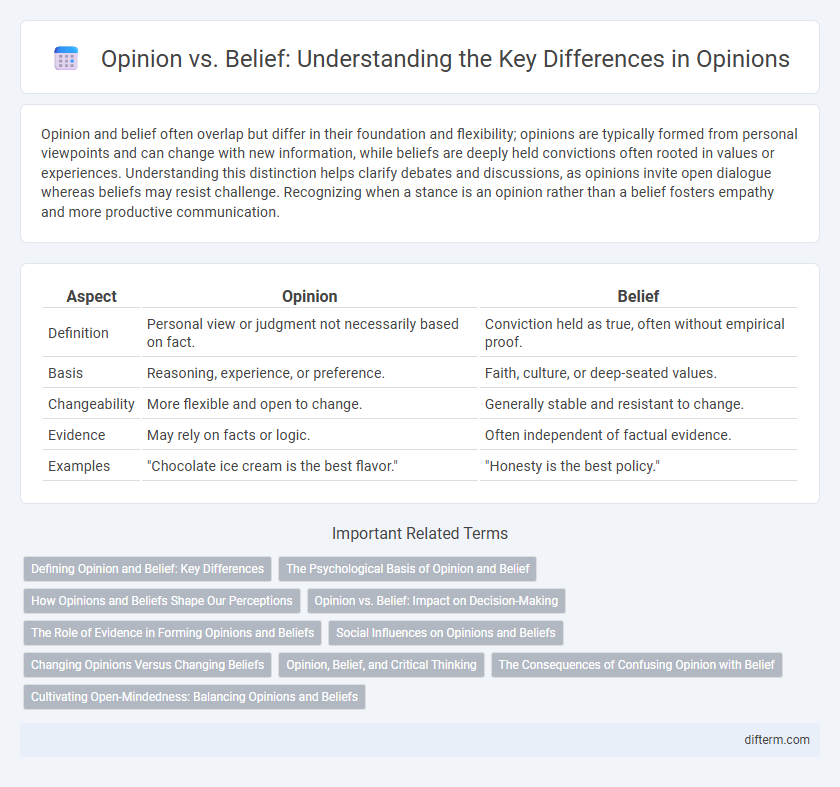Opinion and belief often overlap but differ in their foundation and flexibility; opinions are typically formed from personal viewpoints and can change with new information, while beliefs are deeply held convictions often rooted in values or experiences. Understanding this distinction helps clarify debates and discussions, as opinions invite open dialogue whereas beliefs may resist challenge. Recognizing when a stance is an opinion rather than a belief fosters empathy and more productive communication.
Table of Comparison
| Aspect | Opinion | Belief |
|---|---|---|
| Definition | Personal view or judgment not necessarily based on fact. | Conviction held as true, often without empirical proof. |
| Basis | Reasoning, experience, or preference. | Faith, culture, or deep-seated values. |
| Changeability | More flexible and open to change. | Generally stable and resistant to change. |
| Evidence | May rely on facts or logic. | Often independent of factual evidence. |
| Examples | "Chocolate ice cream is the best flavor." | "Honesty is the best policy." |
Defining Opinion and Belief: Key Differences
Opinion refers to a personal judgment or viewpoint formed about particular subjects, often influenced by individual experiences and emotions, while belief denotes a conviction held to be true, usually rooted in cultural, religious, or evidential foundations. Opinions are flexible and can change with new information or perspectives, whereas beliefs tend to be more stable and resistant to change. Understanding these distinctions clarifies how people process information and relate to differing ideas in social and cognitive contexts.
The Psychological Basis of Opinion and Belief
Opinions and beliefs are grounded in distinct psychological processes that shape how individuals interpret information and form judgments. Opinions often reflect evaluative assessments influenced by current evidence and social context, while beliefs are more deeply rooted cognitive structures tied to identity and emotional commitment. Understanding the neural mechanisms, such as cognitive dissonance and confirmation bias, reveals how opinions are more flexible compared to the enduring nature of core beliefs.
How Opinions and Beliefs Shape Our Perceptions
Opinions and beliefs profoundly influence how individuals interpret and react to information, shaping personal and collective perceptions. While beliefs are deeply ingrained convictions that provide a framework for understanding the world, opinions are more flexible judgments influenced by experiences and knowledge. This dynamic interplay determines attitudes, decision-making processes, and social interactions across various contexts.
Opinion vs. Belief: Impact on Decision-Making
Opinions often reflect personal viewpoints shaped by experiences, while beliefs are deeply held convictions influencing emotional and cognitive processes. In decision-making, opinions provide flexible perspectives open to change, whereas beliefs anchor choices through steadfast values and biases. Understanding the distinction between opinion and belief allows for more nuanced analysis of behavior and reasoning in critical judgments.
The Role of Evidence in Forming Opinions and Beliefs
Opinions are often shaped by the evaluation of current evidence and can change as new information emerges, while beliefs tend to be more deeply held convictions that may persist despite contradictory evidence. The role of evidence is critical in forming opinions, as it allows individuals to adjust their views in response to logical reasoning and empirical data. In contrast, beliefs are influenced by personal values, experiences, and cultural factors, making them less susceptible to change through evidence alone.
Social Influences on Opinions and Beliefs
Opinions and beliefs are both shaped significantly by social influences such as family, culture, and peer groups, which provide the context for individuals to interpret information. Social norms and collective experiences often reinforce certain beliefs, while opinions may fluctuate more readily as they respond to new social interactions and information. Understanding the dynamic between socially influenced beliefs and opinions is essential for analyzing how public attitudes and behaviors evolve over time.
Changing Opinions Versus Changing Beliefs
Changing opinions often occurs more quickly than changing beliefs because opinions are generally surface-level judgments influenced by new information or social context. Beliefs, however, are deeply rooted mental frameworks tied to personal values and identity, making them resistant to change despite contradictory evidence. Understanding this distinction clarifies why persuasive communication strategies must address core beliefs rather than merely presenting factual opinions.
Opinion, Belief, and Critical Thinking
Opinion reflects subjective interpretations influenced by personal experiences and emotions, whereas belief often denotes deeper, sometimes unexamined convictions. Critical thinking involves evaluating opinions critically, distinguishing evidence-based perspectives from mere assumptions. Cultivating critical thinking skills enhances the ability to question opinions, leading to more informed and rational viewpoints.
The Consequences of Confusing Opinion with Belief
Confusing opinion with belief can lead to significant misunderstandings that affect decision-making and interpersonal relationships. Opinions are subjective interpretations open to change, while beliefs are deeply held convictions that shape identity and behavior, often resistant to evidence. Misinterpreting opinions as beliefs may cause unwarranted conflicts, hinder communication, and solidify biases that limit critical thinking and social cohesion.
Cultivating Open-Mindedness: Balancing Opinions and Beliefs
Cultivating open-mindedness requires recognizing the fluid nature of opinions, which are subject to change based on new information, unlike deeply held beliefs that often form the core of personal identity. Balancing opinions and beliefs involves actively questioning assumptions and embracing diverse perspectives to foster intellectual growth. This approach enhances critical thinking skills and promotes respectful dialogue, essential for navigating complex social and cultural landscapes.
opinion vs belief Infographic

 difterm.com
difterm.com